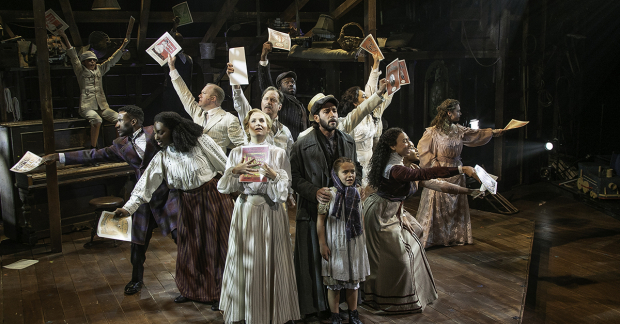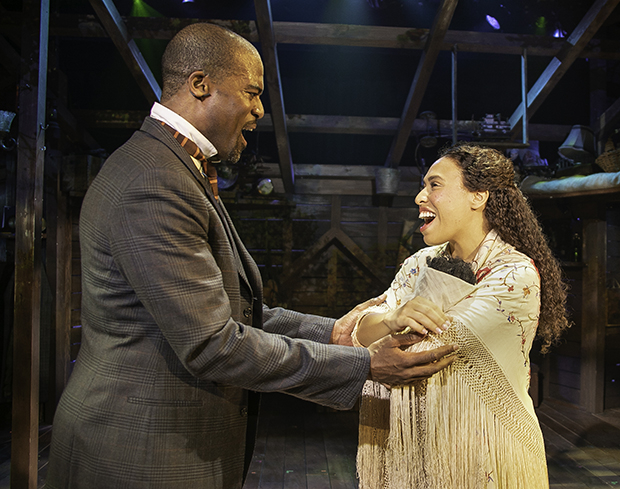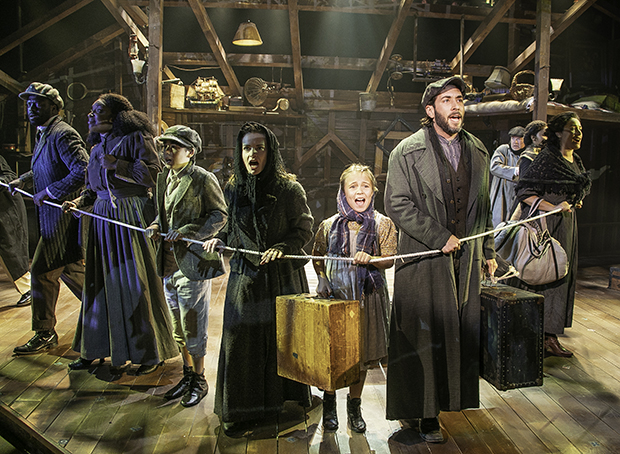Review: In the Hamptons, A Small-Scale Ragtime With a Big Heart and Bigger Voices
Will Pomerantz directs the Terrence McNally, Lynn Ahrens, and Stephen Flaherty musical at the Bay Street Theater in Sag Harbor.

(© Lenny Stucker)
The fallacy of Ragtime is that you must go big. The original Broadway production, often a defining model for how a show is presented, had a cast that numbered nearly 60, with an orchestra of more than two dozen. Even the 2009 revival, which was considerably "scaled down," had a cast of 40. E.L. Doctorow wrote a sprawling novel, and, in turn, Terrence McNally (book), Lynn Ahrens (lyrics), and Stephen Flaherty (music), wrote an expansive musical. But can you do this show in a more economical way and have the impact remain the same?
If director Will Pomerantz's take on Ragtime at the Bay Street Theatre in Sag Harbor, New York, is any indication, the answer is a resounding Yes. There are only 18 actors in the company, often doubling, tripling, and quadrupling in roles. The orchestra totals five players. There's one single set (by Anna Louizos) — a dusty old attic, perhaps in that house at the crest of the Broadview Avenue Hill in New Rochelle — a smattering of period costumes (by Hunter Kaczorowski), and a handful of projections (by Brian C. Staton). And it ranges from "merely wonderful" to "absolutely amazing."
Weaving together the stories of three very different families at the turn of the 20th century, Ragtime feels almost prescient in its depictions of racial and economic warfare, an unfortunate reminder that history repeats. At the center are Mother (Lora Lee Gayer), a wealthy, white New Rochelle matriarch who takes in Sarah (Kyrie Courter), a young Black woman, and her newborn son. Sarah is being courted by the baby's father, Harlem pianist Coalhouse Walker Jr. (Derrik Davis), who arrives like clockwork every Sunday bearing flowers, and faces the same racist behaviors from the local volunteer firemen week after week. Along the way, they cross paths with Tateh (Zachary Prince) and his daughter (Sonnie Betts), Jewish immigrants recently arrived from Latvia on a quest to obtain their American dream, and real-life figures like anarchist rabblerouser Emma Goldman (Victoria Huston-Elm), performer Evelyn Nesbit (Cathryn Wake), and escapologist Harry Houdini.

(© Lenny Stucker)
Though created on a smaller scale, Pomerantz's production doesn't compromise the integrity of the piece: He removes the gargantuan nature of everything but the emotions and simply has his cast tell the story, which is pretty much all you need. That, plus Ahrens and Flaherty's overwhelming score, which is an embarrassment of riches in its own right. Is there a more glorious order of songs than "Your Daddy's Son," "The Courtship," "New Music," and "Wheels of a Dream"? Only, for my mind, "Sarah Brown Eyes," "He Wanted to Say," "Back to Before," and "Make Them Hear You."
We're lucky just to hear these songs again live, and even luckier to hear them performed so resplendently. Gayer gives us a tender "Goodbye, My Love" at the start as her husband, Father (the imperious Daniel Jenkins), sets off on a journey to the North Pole, and caps off her nicely drawn evolution from put-upon housewife to woman with her own power with a ferocious "Back to Before," one of many musical highlights. Davis is a proud and commanding Coalhouse; his "Wheels of a Dream" and "Make Them Hear You" are as roof-raising as you want them to be. Prince makes for a tender and lovable Tateh, imbued with old country Yiddishkeit, while Courter is an elegant and headstrong Sarah.
The whole cast, though, is entirely terrific as they shapeshift their way through dozens of characters. Together, they have the voices of a company twice this size. Even the band, led by conductor James Bassi and playing orchestrations by Ryan Touhey, has a big sound despite only containing a piano, trumpet, reeds, violin, and synth. This Ragtime is a marvel of small-scale, high-quality musical storytelling, and if we're lucky, it'll have a longer life than just this month.

(© Lenny Stucker)










